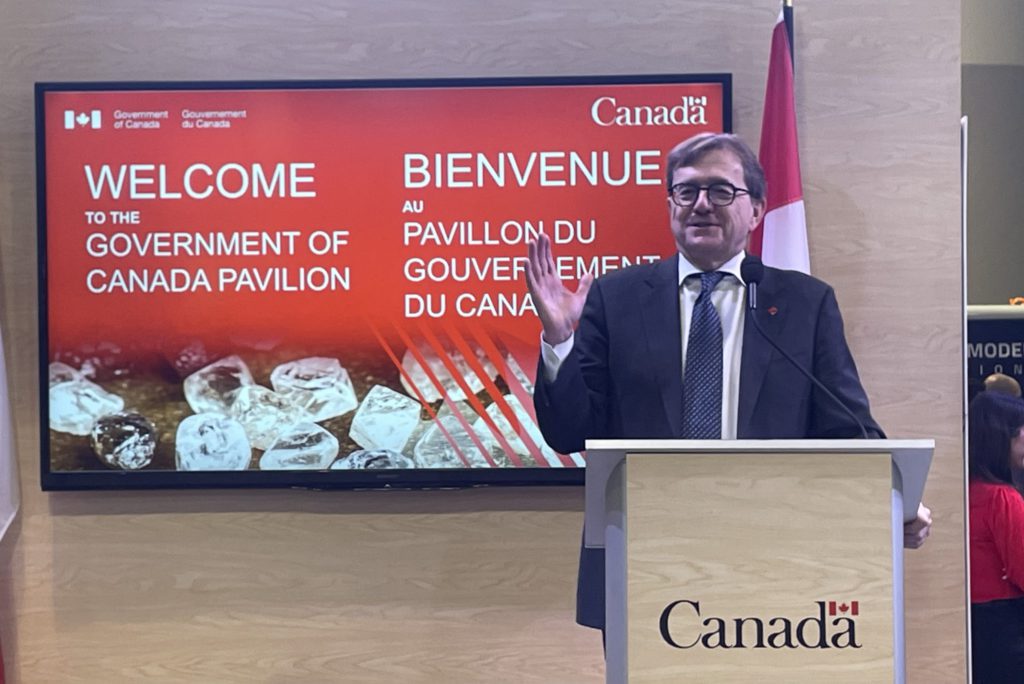Colin McClelland | March 6, 2024 |

Canadian Natural Resources Minister John Wilkinson says the government has been clear about foreign investing in critical minerals. Credit: Colin McClelland
The federal government says it’s considering how to handle offtake agreements that function as loans or investments by China in Canadian mining companies as it continues to clamp down on critical mineral transactions by the Asian giant.

First Quantum Minerals (TSX: FM) inked a $500-million deal last month to supply Jiangxi Copper from the Kansanshi mine in Zambia as the Vancouver-based miner strives to shore up finances after authorities shut its Cobre Panama mine in the Central American country.
“There are active conversations going on about how best to approach some of those kinds of issues,” Natural Resources Minister Jonathan Wilkinson told reporters in Toronto. “What you’re going to find increasingly moving forward is democratic countries around the world coming together to try to find pathways through which we actually are ensured of access of the minerals we’re going to need.”
The largest shareholder in First Quantum is Jiangxi Copper, but Wilkinson said the government won’t pursue investments that pre-date its critical minerals divestment strategy. It began in November 2022 by targeting three TSX-listed lithium companies. Ottawa hasn’t changed its stance on reviewing Chinese investments in Canadian critical mineral companies, he said, even as recent deals highlight continued interest from the mining and processing behemoth.
“We’ve been pretty clear that we are not interested in investment generally from state-owned enterprises,” Wilkinson said in reply to a question from The Northern Miner at the Prospectors and Developers Association of Canada annual conference in Toronto. “Certainly the ones that are raising significant flags would be those that actually require some kind of offtake agreements, those that require control – effectively controlling shareholders – or provide for significant board representation.”
Competing interests
The federal reviews must walk a line between competing interests. On one side are mining companies, especially at the junior level, who are facing what they believe is an unprecedented funding crunch from lack of stock markets investing in the industry and who turn to industrial power China for backing. On the other side is the rising trend of resource nationalism for security as countries in the West try to diminish China’s dominance in critical mineral mining and processing.
China’s Yintai said last month it would buy Osino Resources (TSXV: OSI; US-OTC: OSIIF) for C$368 million, Zijin Mining invested $97 million for 15% of Solaris Resources (TSX: SLS; US-OTC: SLSSF) in January and Vital Metals (ASX: VML) said in December that Shenghe Resources was buying stockpiles of rare earth elements mined at its Nechalacho project in the Northwest Territories.
Each of those deals might have some wiggle room under a review. Osino’s primary asset is the Twin Hills gold project in Namibia. Gold is not one of Canada’s 31 critical minerals. Solaris is digging for copper, a critical mineral, but 15% isn’t regarded as a controlling stake. Vital is an Australian company, so Ottawa doesn’t have direct recourse under Canada’s Investment Act, though it does have a say in permits for the project.
On Tuesday, Montreal-based SRG Mining (TSXV: SRG) said it’s cancelling a $12.5 million deal with China’s Carbon ONE New Energy Group to take a 19.4% stake in the graphite miner. It had said last week it would incorporate in Abu Dhabi while maintaining its Toronto listing.
“That was a helpful decision that they would essentially not re-domicile in order to accept Chinese investment,” Wilkinson said. “But certainly we will be looking at all transactions that involve Chinese state owned enterprises and those companies related to them.”
No comments:
Post a Comment